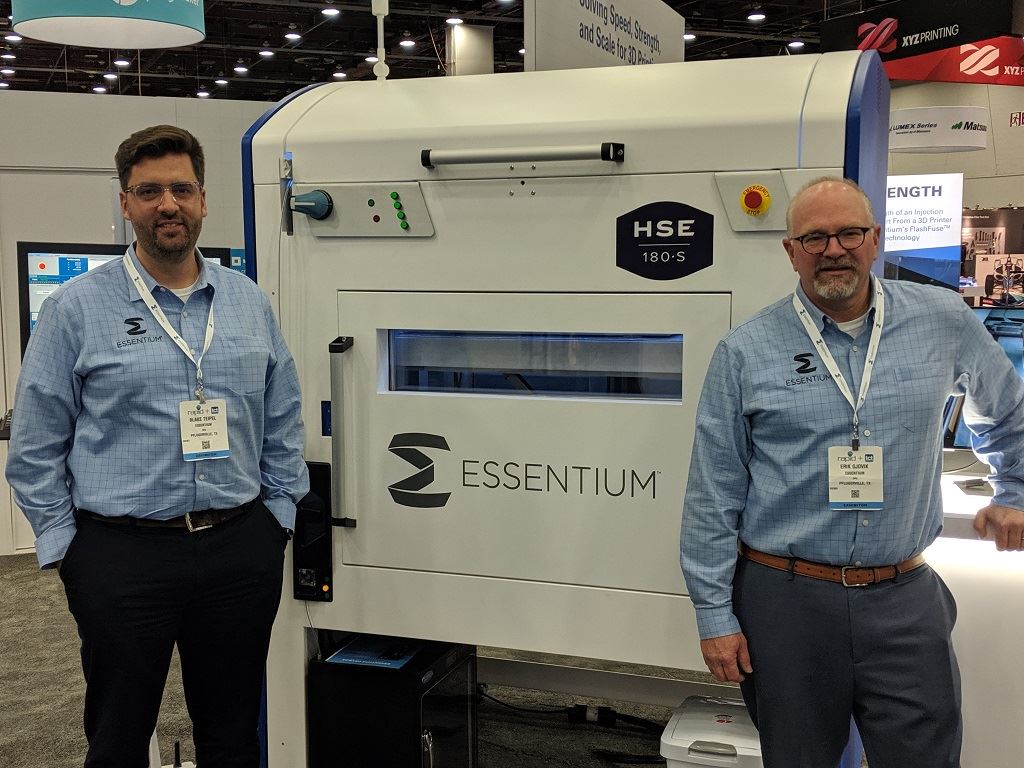![Essentium Co-Founders with the HSE 180•S: CEO Blake Teipel (left) and CPO Erik Gjøvik [Image: Fabbaloo]](https://fabbaloo.com/wp-content/uploads/2020/05/essentium_img_5eb0961986d9d.jpg)
Are you paying attention to Essentium? You should be.
The company’s High Speed Extrusion (HSE) 3D printing is powerful, and we’ll be seeing a lot more of it — everywhere, really. The company has already announced a good deal of partners, but according to Co-Founder and CEO Blake Teipel, PhD, “90% of our partners are still in stealth.”
Partnerships And HSE 180•S
Among some of the big names already revealed are BASF and Materialise, Mitsubishi Chemical, Midwest Prototyping, Vorum, and Reebok. Even with these named partners, details are pretty scarce; Teipel wanted to highlight Reebok in our recent conversation, but couldn’t go deep into it; “I’m not saying exactly what they’re doing, but it’s a perfect fit.”
The impressive HSE 180•S is also priced at only around $75-115,000, Teipel added. For all it’s capable of, especially in comparison to similarly priced systems, that’s rather notable. Essentium will begin shipping in July, and it’s starting as a “slow trickle out the door.” As of our chat, fewer than ten units are out in the world. By the end of the year, it will be more than 50 — and that’s “based on manufacturing capacity; we have more pre-orders than that.”
“The HSE 180•S was designed to be the nucleus of a production ecosystem,” Teipel said. “It moves like a mill or a lathe, not a 3D printer; it’s bridging the flexibility of 3D printing with the productivity of CNC.”
Phase one of their rollout, in 2019 and 2020, focuses on the factory floor, he said, where the system is seeing use in applications such as automotive, contract manufacturing for electronics, aerospace and defense, medical (especially orthotics and prosthetics), and apparel. These are all uses that typically rely greatly on tooling and molding, which can be sped up or eliminated with 3D printing.
Product Focus
The difference for HSE and for Essentium really comes down to the materials. Indeed, it was for materials that the company first caught our attention. Now the company is manufacturing its multi-layered filaments in Texas, where it is certifying material production in Meadowlands and will have them “shortly available.”
“Everything for us is scale-focused,” Teipel said. “We have a new headquarters in Austin, that’s 25,000 square feet. We have a 2500-square-foot facility in Irvine, California, and a permanent presence in Shanghai. We’ve established a legal entity for European operations in Germany, and that’s now in final site selection.”
The focus is simple, he continued: “Product, product, product.”
That is still biggest for materials, as the company is “going all-in on ESD materials: they have so many benefits, tunability, cost, it’s the extrusion of the future.”
On the software side, the partnership with Materialise is big news for Essentium. Multiple modules of Materialise software is being embedded into HSE, and that’s “going over very well when we talk about applications.” As with many companies, “software is a big focus” in ensuring productivity and reliability — performance, in other words.
“It’s easy on the materials side to say ‘open,’ but with software, what does that mean? We have an integrated software solution to speed up workflow, track the whole digital thread,” Teipel said.
Of that materials openness, Teipel touched as well on the Essentium Materials Partner Program. It’s manufacturing-based, with “BASF the nearest and dearest” partner — but by no means the only. Customers, Teipel emphasized, should have access to the materials they need, and “sometimes that means Mitsubishi or SABIC or someone else.”
“Materials companies are coming at us,” he added. “We’re seeing this rush now toward this future. 3D printing is opening specs, like we’ve seen in CNC and other traditional technologies.”
Indeed, traditional materials companies — BASF, Mitsubishi, SABIC, Solvay, Henkel, Evonik, DuPont — all have a heavy and increasing presence in the 3D printing industry today. Partnering with machine manufacturers ensures that materials can be precisely calibrated to a given process, allowing users the freedom of choice to work with new technologies and familiar materials.
Watch This Space
When it comes to 3D printing itself, Essentium is as always ambitious. Very ambitious.
“We’re really going to take the world by storm,” Teipel said plainly. “If you look at extrusion-based 3D printing, innovation stopped ten years ago. We aim to be the best extrusion-based platform, full stop.”
He noted that the HSE system is most often shopped against Stratasys’ Fortus line and HP’s Multi Jet Fusion technology, which also gives an idea of the kinds of customers they’re hearing from.
There’s much more to come from Essentium, and some of it that isn’t yet ready for release makes a lot of strong business sense. Hopefully more on that soon.
There’s ambition in 3D printing — and then there’s delivering. As the HSE 180•S fully hits the market starting soon and more installations are up and running, more partners publicly revealed, and more strategic announcements ready to be shared, we’ll be sure to hear more soon from Essentium.
They’re very much one to watch.
Via Essentium











Essentium announced a pair of new materials for their high speed 3D printer, and there’s an interesting story behind the move.